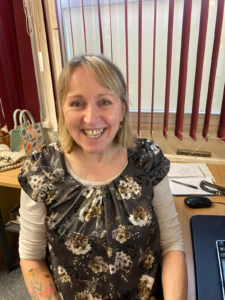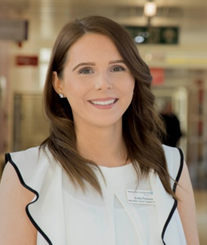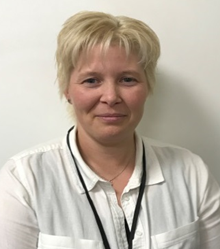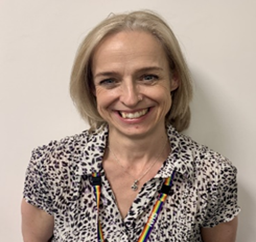World Cancer Day is an initiative of the Union for International Cancer Control (UICC), the largest and oldest international cancer organisation dedicated to taking the lead in convening, capacity building and advocacy initiatives that unite the cancer community to reduce the global cancer burden, promote greater equity, and integrate cancer control into the world health and development agenda.
The day was born on the 4 February 2000 at the World Summit Against Cancer for the New Millennium in Paris. The Paris Charter aims to promote research, prevent cancer, improve patient services, raise awareness and mobilise the global community to make progress against cancer, and includes the adoption of World Cancer Day.
As one of the leading cancer centres in the country, the Kent Oncology Centre turns 30 years old this year and continues to offer our patients some of the fastest possible access to treatment, using state-of-the-art technology in an environment which continues to expand every year. The Trust cared for over 900,000 patients in 2022, including nearly 100,000 MRI and CT scans and over 50,000 radiotherapy treatments as our sites saw a record-breaking year across our services.
The Trust has nearly 8,000 colleagues working together as one team to ensure our cancer services offer patients the best possible outcomes. Below you can find out more about just some of them!
Dr Catherine Harper-Wynne, Consultant Medical Oncologist
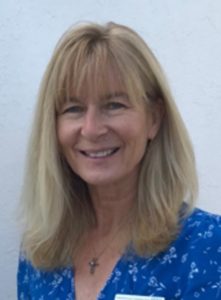 Tell us about your career and your role…
Tell us about your career and your role…
I am a Consultant Medical Oncologist, responsible for the management and treatment of breast cancer at Maidstone Hospital, Kent Oncology Centre. I trained at the Royal Marsden Hospital, completing an MD research project in hormone related breast cancer. The combination of personalised patient care, and continued clinical research was the attraction to a career in oncology and specifically breast oncology. This specialty and the patients that I care for, continues to inspire me. We continue to drive forward with new regional approaches, and service developments within cancer care, which will improve quality and equity of service in our county and surrounding region.
Tell us an interesting fact about your role…
Outside of the clinic, I am involved in developing policy and clinical practice for breast cancer management at national level working as a representative on the NHSE Clinical Advisory Group, National Cancer Covid Group, and was appointed as Co-Chair of the UK Breast Cancer Group in December 2022. There is a strong oncology research culture within the county. I am a Lead Researcher for oncology within the Trust. Over many years, we have always been one of the highest recruiters to international breast cancer trials. We continue to do this as a team, and work in partnership with our patients to provide a portfolio of clinical trials that offer patients accessibility to “tomorrow’s treatment today”.
What do you enjoy about working for MTW?
Breast oncology care at MTW is centred around a team approach, including nurses, pharmacists, radiographers and radiologists, and the team continues to grow as the treatment and care becomes more complex. It is this team-based approach that really makes working an enjoyable and satisfying process, in the knowledge that patient care and experience has improved and continues to improve by adopting this model.
Why are days such as World Cancer Day important?
World cancer day is important, as although cancer does have a high profile internationally, there is more work to be done. Nationally we must cope with the success of cancer care, resulting in the ever-increasing number of patients living longer with cancer. This has other potential health and social problems for individuals, and to our health care system. Internationally we need to be mindful of the inequity across the globe and how we can assist the developing world in accessing good care.
Tell us an interesting fact about you…
Outside of work I shake it all off by singing in a local popular music band!
Mariq Weatherley, Principal Clinical Scientist (Nuclear Medicine)
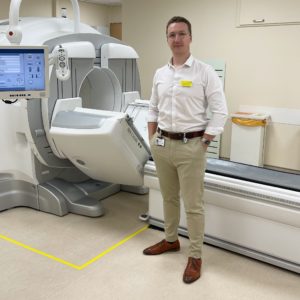 Tell us about your career so far…
Tell us about your career so far…
On completion of an undergraduate degree in Physics at the University of Kent (Canterbury) I secured a position as a trainee Clinical Scientist in the nuclear medicine physics department of Maidstone Hospital. As part of my training, MTW supported me through a Master’s Degree in Medical Physics. I am now an HCPC registered Clinical Scientist and work as a principal Clinical Scientist in nuclear medicine physics.
Briefly tell us what your roles involves…
The role of the Clinical Scientist in Nuclear Medicine is to support and advise the clinical teams to ensure all of our diagnostic tests and therapeutic treatments are safe and optimised.
What do you most enjoy about your job and why is your role so important?
I enjoy how my work contributes to improved patient care and has a measurable impact on the care and wellbeing of our patients. Nuclear medicine is a heavily regulated specialism and the role of the Clinical Scientist is to ensure that we can provide crucial and beneficial services to our patients whilst staying on the right side of the law!
What inspired you to do what you do?
When I chose to study Physics at University, I never considered that I might end-up helping cancer patients; I now take pride in my work and cannot see myself doing anything else.
Why do you think days such as World Cancer Day are so important?
It is important to raise awareness to encourage us to prevent, detect and treat cancer.
What has been the best moment of your career?
Obtaining registration as a Clinical Scientist with the Health and Care Professions Council (HCPC) after four long years of training.
Tell us an interesting fact about your role…
Not many people know that physicists work in clinical environments as a lot of our work is done behind-the-scenes. People find it interesting when they find out and often want to learn more.
Tell us an interesting fact about you…
I have an allotment and I enjoy trying to grow my own fruit and vegetables.
What do you enjoy most about working for MTW?
Patient’s often pass on positive feedback about the care they receive from MTW. This inspires me to continue to provide the best service I can for our patients.
Karen Grant, Medical Secretary
I have enjoyed working for four different Trusts spanning across 10 years including KCHFT, EKHUFT, Hillingdon Hospital NHS Trust and now MTW. During this time, I’ve been able to work across a wide range of different specialties, including child health, geriatrics and occupational health.
What does your role involve?
I work from MTW’s Canterbury site and my role involves patient communications to a high standard, via email and phone and sometimes face to face. Ensuring patient information is correct is vital in our field, and that it goes out in timely fashion to the patient and relevant teams such as GP’s and onward referrals.
Why is your role so important and what inspires you to do it?
This role is important because we are the first point of contact for most patients and we represent our Trust. I am inspired to do what I do because I love helping people and I’m passionate about the role because I believe I make a difference to our patients and their experiences with us at MTW.
Why are days like World Cancer Day so important?
World Cancer Day is important because it raises awareness and funding which is crucial especially now as cancer now affects one in two people.
What has been the best moment of your career?
Too many to mention! Getting voted for employee of the month and all the thank you cards from patients means so much. No two days are the same in this role and I always find myself learning something new.
Tell us an interesting fact about you…
Also too many to mention! I’m ex-Army and ex-Police and also a member of the RSPB, Kent Wildlife Trust and Friends of the Earth. I try to be an eco-warrior! I’m also a keen runner and have previously done the Lincoln Half Marathon and Great North Run. I also used to live in Germany for five years.
What do you enjoy most about your role?
No two days are the same in this role and I always find myself learning something new. I love the team I work with and the patients I help every day.
Rosemeen Parkar, Consultant Medical Oncologist
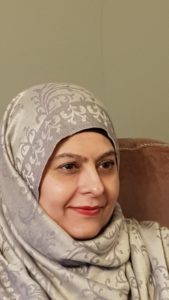 Tell us about your career so far and what your role involves…
Tell us about your career so far and what your role involves…
On completion of my Oncology training which involved rotating in London trusts, I secured my consultant post at MTW. My role involves initiating treatment for melanoma patients with the help of my team supporting them through treatment. I am also involved in teaching junior doctors.
What do you most enjoy about your job?
I love the interaction with different patient groups and challenges of dealing with patients who are dealing with this diagnosis.
Why is your role so important and what inspires you?
I feel it’s important because the aim is to achieve the best outcome for my patients whether they are on a curative or palliative pathway. I think being diagnosed with cancer when I was a junior doctor inspired me into choosing this specialty.
What makes you passionate about your role?
The deep satisfaction I get when I discharge a patient from my clinic and the difference I make to those that I do keep on forever.
Why do you think days such as World Cancer Day are so important?
They are an ideal platform to raise awareness and also helps both the professionals and the patients get together for the common cause.
What has been the best moment of your career to date?
Getting a consultant post in a specialty that I love.
Tell us an interesting fact about you…
Love baking and travelling.
What do I enjoy most about working for MTW?
I have met some of the most down to earth humble and friendly people in my department. I would not leave for anything!
Claire Ryan, Macmillan Consultant Nurse Metastatic Breast Cancer
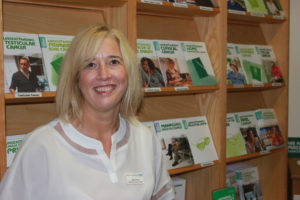 Tell us about your career so far and what your role involves…
Tell us about your career so far and what your role involves…
I have been a registered nurse for 31 years, and worked in Breast Oncology for 26 years. My general nurse training was based at University College London Hospital, and The Middlesex Hospital in 1991. I completed my cancer nursing training at The Royal Marsden Hospital. I was one of the first Consultant Nurses in the UK working within breast cancer, and was the first in the UK to work in a role dedicated within the specialty of metastatic breast cancer.
What makes you passionate about your role?
Aside from my day to day nursing role, I am passionate about nurse education, succession planning for the next generation of nurses working with the specialty, who are, and will be caring for people living with metastatic breast cancer. I lecture widely at national and international conferences, chair national meetings, and sit on expert management groups, Department of Health and pharmaceutical advisory groups, and frequently act in a consultative role to national charities Breast Cancer Now and Macmillan. Being involved in policy to improve equity in patient service and care, as well as share best practice for the national community affected by metastatic breast cancer, is as important as looking after my own patient group.
What has been the highlight of your career so far?
A highlight of my career has been the opportunity to work with co-authors to develop a nurse education programme on metastatic breast cancer throughout Europe. The modules that I have written have been translated into multiple languages, for the European Oncology Nursing Community. I had the privilege of delivering this education to the Turkish Nursing Community in October 2022. This project was to navigate Turkish health care providers, with an educational programme linked with the Universities to develop the role of the Clinical Nurse Specialist in Breast Cancer.
Another highlight has been stepping into a Trustee role in September 2022, with national charity Breast Cancer Now.
What do you most enjoy about your role?
The privilege of the role offers the opportunity to make a difference, no matter how small, to someone who is maybe worried, feeling vulnerable, uncertain about their future. It is the reason I continue to nurse, and still continue. I was humbled to be appointed Kent Messenger Hospital Hero in 2015.
Tell us an interesting fact about your role…
I am a longstanding advocate for UK charities Breast Cancer Now, and Macmillan, and have contributed to the development and delivery of information services, delivering podcasts and webinars, and regularly review patient literature for the metastatic breast cancer specialty.
Tell us something about you…
I do need down time, and in that time, I enjoy running – shuffling really! I also enjoy long walks, travelling and learning about new cultures.
Ade Meleki, Senior Multidisciplinary Team Co-Ordinator
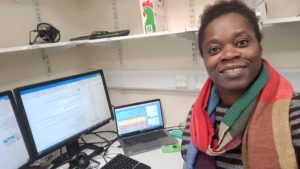 Tell us about your career so far and what your role involves…
Tell us about your career so far and what your role involves…
I have worked various roles at different trusts, all administrative roles, and responsibilities. Currently, I work with the cancer performance team. I am a Senior Multi-disciplinary Team Coordinator for the Haematology Team and Stereotactic Radiotherapy [SABR] Team I have also covered and enjoyed the Head and Neck and Thyroid MDMs. My role involves preparing, recording, and documenting outcomes for multi-disciplinary meetings. Ensuring accurate data is inputted. I work with consultants, nurse specialists, radiologists, and histopathologists. I also track patients daily, from the moment a referral is received by the team until they are treated.
What do you enjoy most about your role?
My role is crucial in ensuring cancer patients receive swift, personalised, and appropriate treatment.
I enjoy working with the great mixture of brilliant and dedicated people from the clinical and non clinical teams. I wanted something different for a job – I needed a challenge, and I got it! I thoroughly enjoy my job, though it can be quite challenging and pressured it can be equally as rewarding.
Why are days such as World Cancer Day important?
World cancer day is important because it is essential to spotlight the effects of this devastating disease, celebrate the triumphs, new research and create even more awareness.
Tell us something about you…
I enjoy philanthropy and I try in my unique, small way to do good. It is very important to me and I am very intentional about ensuring the people around me are comfortable and I am known to make some folks smile or have proper belly laughs. Though it’s possible they’re just laughing at me!
Michelle Newman, Senior Therapeutic Radiographer
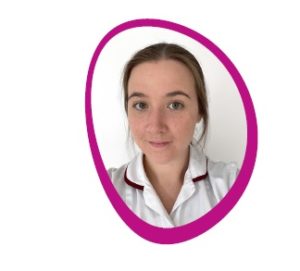 Tell us about your career so far…
Tell us about your career so far…
I trained at undergraduate level for three years prior to starting my career as a newly qualified radiographer at MTW in the summer of 2019. I am now based at Maidstone Hospital, working within the Kent Oncology Centre (KOC).
What does your role involve?
I work within a team of Therapeutic Radiographers to deliver highly targeted radiation to treat cancer patients using a machine called a linear accelerator (LINAC). I work alongside other healthcare professionals, including: registrars, consultants, medical physicists and dietitians to ensure accurate and effective delivery of radiotherapy treatment. There are nine LINACs in operation within KOC, six located at Maidstone and three in Canterbury.
What does a typical day look like for you?
A typical day can start off at a pretty fast pace and I am usually scheduled to work on one of Maidstone’s six LINACs each day. Each LINAC can see up to 40 patients a day over the hours of 8am-8pm with the team working flexibly to cover this 12 hour period. There is an overlap of teams in the middle of the day where we can discuss any pertinent information regarding our workload and ensure that paperwork is completed efficiently.
What do you enjoy most about your role?
There is a great variety in the cases that we see each day which means I am always learning something new. I love the ever-evolving world of radiotherapy; it definitely keeps you on your toes! I have the privilege of being involved in each and every one of my patient’s cancer journeys; I have the opportunity to offer support and information at such a difficult time. I am proud to be a part of the service offered, working within the MTW team to provide excellent patient care.
Jenny Filmer, Practice Development Radiographer
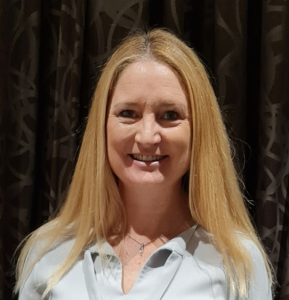 Tell us about your career so far…
Tell us about your career so far…
I grew up in South Africa and I started my career as a Diagnostic Radiographer, but after a full year working in what some people call the crime capital of the world, I quickly realised the trauma field was not for me. I then undertook my B-Tech Degree in Therapeutic Radiography and in 2004, I accepted a job at Maidstone Hospital as a band 5 treatment radiographer. I moved up to a band 6 treatment position within a year and then moved across to the Pre-Treatment department in 2005, where I have enjoyed developing my skills in planning and gaining clinical expertise in the CT. I was the breast site specialist in Pre-Treatment for many years. I have worked at the KOC for 19 years and have enjoyed roles like the Safe Space Champion and training students and new staff. I started in my new position of Practice Development Radiographer in December last year.
What does your role involve?
I am responsible for supporting staff with their training and education. We are a busy centre and we have about 60 treatment radiographers at our Maidstone site and about 30 treatment radiographers at our Canterbury site. I work closely with the Practice Educator who supports all our students and newly qualified radiographers. I work cross-site in order to fully support the educational needs and the induction process of new starters. I am responsible for working with the management leads to ensure that we are investing in a workforce that is fit for purpose for the future requirements of the Radiotherapy service within Kent. This includes promoting our profession to schools and the public.
What do you enjoy most about your role?
The aspect I most enjoy about my role is being able to offer support to Therapeutic Radiographers, to encourage and motivate them to strive to reach their full potential in their careers. I have enjoyed my 20+ year career so far and I hope to impart my knowledge and skills to those who are developing in their careers.
Tell us something about you…
I live a very full and busy life and to keep active I enjoy swimming, running and going to the gym. I have two teenage boys who keep me on my toes! I am an extremely positive person and I hope that some of that positivity rubs off on those around me.
Why do you think days such as World Cancer Day are so important?
World Cancer Day is an important way to show case cancer care and the varying roles that support cancer patients get through their treatment and beyond. I think most people know someone who has suffered with cancer. There are many roles behind the scenes that people are unaware exist, so a day like this will highlight areas that may be of support to someone going through the challenge of a cancer diagnosis and treatment pathway.
What has been the best moment of your career?
I feel incredibly honoured to have been given the opportunity of undertaking my masters degree. This week I heard the news that I have passed my dissertation, which was the final module in achieving my Masters Degree in Radiation and Oncology. My wonderfully supportive husband, family, friends and colleagues have encouraged me to achieve this academic goal! MTW supported me with this achievement and I am so grateful!
What do you most enjoy about working for MTW?
I have enjoyed a full and rewarding career at MTW and the aspect I enjoy most about working here is the people I work with on a daily basis, whether that be a colleague, manager, student, new member of staff, a cleaner, chaplain, patient or a member of the public. I am a people person and always willing to make time for others.
David Margetts, Deputy Head of Physics Engineering
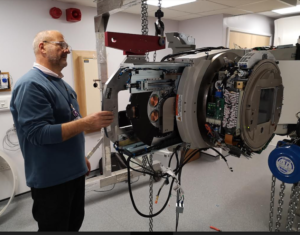 Tell us about your career so far…
Tell us about your career so far…
I’ve worked all over the world, with many different companies, mostly on medical devices of one sort or another, and now find myself doing what I enjoy most, fixing complex equipment which helps people recover from cancer.
Briefly tell us what your roles involves…
I work within a team that looks after linear accelerators and CT scanners, ensuring they work well when they are needed.
What do you most enjoy about your job?
Every day is different and there’s scope for personal improvement – even at my great age!
Why is your role so important?
The systems we work on are used daily to help patients recover from cancer, so their presence and availability for use is a key factor in the patient’s chances of recovery.
What inspired you to do what you do?
I never aspired to work in medical physics – it all sort of happened by accident, but that said, I’ve always been very proud of working within the medical environment.
What makes you passionate about your role?
Hearing patients ring the ‘End of treatment bell’, (which marks the completion of their radiotherapy sessions), lets us know in some small way that we’ve helped another patient in their battle with cancer.
What has been the best moment of your career?
My whole career has been largely ‘best moments’ interspersed with occasional worst moments, but if I had to pick one event – it would be seeing an investment of time, patience and the coaching of an employee paying off in their individual success.
Tell us an interesting fact about your role…
I’m a STEM ambassador within the local schools and enjoy attempting to instil enthusiasm in our youngsters about science and technology.
Tell us an interesting fact about you…
I am a member of Toastmasters International.
Annabel Kennedy, Metastatic Breast Clinical Nurse Specialist
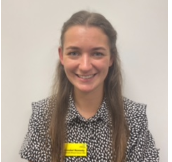 Tell us about your role and your career so far…
Tell us about your role and your career so far…
I am very new to the role, started in October 2022. When I qualified in 2018, I worked as a critical care nurse and specialised in Oncology as a chemotherapy nurse
What does your role involve?
My role involves advocating for patients with MBC, often we are their main point of contact. We help ensure patients have access to information and advice about their diagnosis and treatment. We support patient’s decision making and encourage them to self – manage and become proactive in their care. We regularly undertake holistic needs assessments (HNAs) and nurse led clinics.
What do you enjoy most about your role?
My role is incredibly rewarding; knowing that we make a difference of a daily basis whether it be something very small. Patients put their trust in us and I love that we are able to develop relationships with the patients and their loved ones. Early access to a CNS has been shown to reduce hospital admissions and improve the patients experience. We are the important point of contact for our patients, advocating on their behalf and offering emotional support. It is truly a privilege to work within a fantastic team at MTW. I am passionate about holistic care and ensuring that every aspect of an individual is considered, whether that be their physical, psychological, social, sexual, or financial wellbeing.
Tell us something about you…
I regularly attend ‘powerwave’ sessions and am part of a running club.
Emily Parsons, Louise Griva and Tabatha Curtis: Cancer Support Workers
Tell us about your roles…
We are the cancer support workers for both the metastatic colorectal cancer and metastatic breast cancers teams at MTW. Combined we have over 10 years experience primarily working alongside patients, the Macmillan Clinical Nurses and the Oncology Consultants for these two diverse specialities. However, the nature of our role means that we work with all departments within oncology, and at times departments in the main hospital, to provide a smooth and efficient service for our patients.
What do your roles involve?
Our roles are administrative and varied. We mange whatever each day throws at us and no one day is the same as the next! Although we are a small part of the metastatic Breast and Colorectal teams we are respected within those teams without hierarchy or prejudice. We are often the first point of contact for patients and their families and we aim to support them however we can, to the best of our ability, at the best and worst of times. The role is a privilege and we never take for granted the trust that patients and the oncology team place in us.


